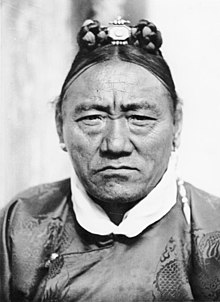Tsarong Dasang Dadul | |
|---|---|
| ཚ་རོང་ཟླ་བཟང་དགྲ་འདུལ་ | |
 Tsarong in 1938 | |
| Kalön of Tibet | |
| In office 1914–1929 Serving with Khemey Rinchen Wangyal (until 1921), Trimön Norbu Wangyal (until 1934), Ngabo (since 1921), and Lobsang Tenyong (since 1925) | |
| Monarchs | 13th Dalai Lama 14th Dalai Lama |
| Commander-in-chief of the Tibetan Army | |
| In office 1913–1925 | |
| Personal details | |
| Born | Namgang 1888 Phenpo, Tibet, Great Qing |
| Died | 14 May 1959 (aged 70–71) Lhasa, Tibet, China |
| Nationality | Tibetan |
| Spouse | Padma Dolkar (daughter of Tsarong Wangchuk Gyalpo) |
| Occupation | Politician, general |
| Military service | |
| Allegiance | Tibet |
| Branch/service | Tibetan Army |
| Rank | General |
| Battles/wars | 1959 Tibetan uprising |
Tsarong Dasang Dramdul[a] (1888–1959), commonly known mononymously as Tsarong or by his title Tsarong Dzasa, was a Tibetan politician and general in the Tibetan Army. He was a close aide of the 13th Dalai Lama and played an important role in the early twentieth century politics of Tibet.[1] Eager to accelerate economic progression and pursue the modernization of Tibet, Tsarong believed that the old order in Tibet had to be broken by hierarchical reforms to prepare the way for a more modern society which would be compatible with the outside world. In his efforts to build up Tibet's defense systems and relations with European powers as well as to facilitate trade and strengthen the Tibetan currency, he made a series of diplomatic visits to British India. His diplomatic skills came to see him regarded by the British as being, "the most powerful friend of His Majesty's Government in Tibet."[2]
Tsarong was captured by the People's Liberation Army following the failed March 1959 uprising in Lhasa. He died in prison shortly afterwards, before his scheduled "struggle session" in Lhasa.[3]
Cite error: There are <ref group=lower-alpha> tags or {{efn}} templates on this page, but the references will not show without a {{reflist|group=lower-alpha}} template or {{notelist}} template (see the help page).
- ^ Taklha, Namgyal Lhamo (2001). Born in Lhasa. Ithaca, NY: Snow Lion. pp. 10. ISBN 1-55939-102-2.
- ^ "Tsarong Dzasa". The Tibet Album, British Photography in Central Tibet (1920–1950), Oxford University. Retrieved February 3, 2009.
- ^ "Profile: Important People in Tibetan History:Dasang Dadul Tsarong" (PDF). The Tibet Museum. 2006. Retrieved February 3, 2009.